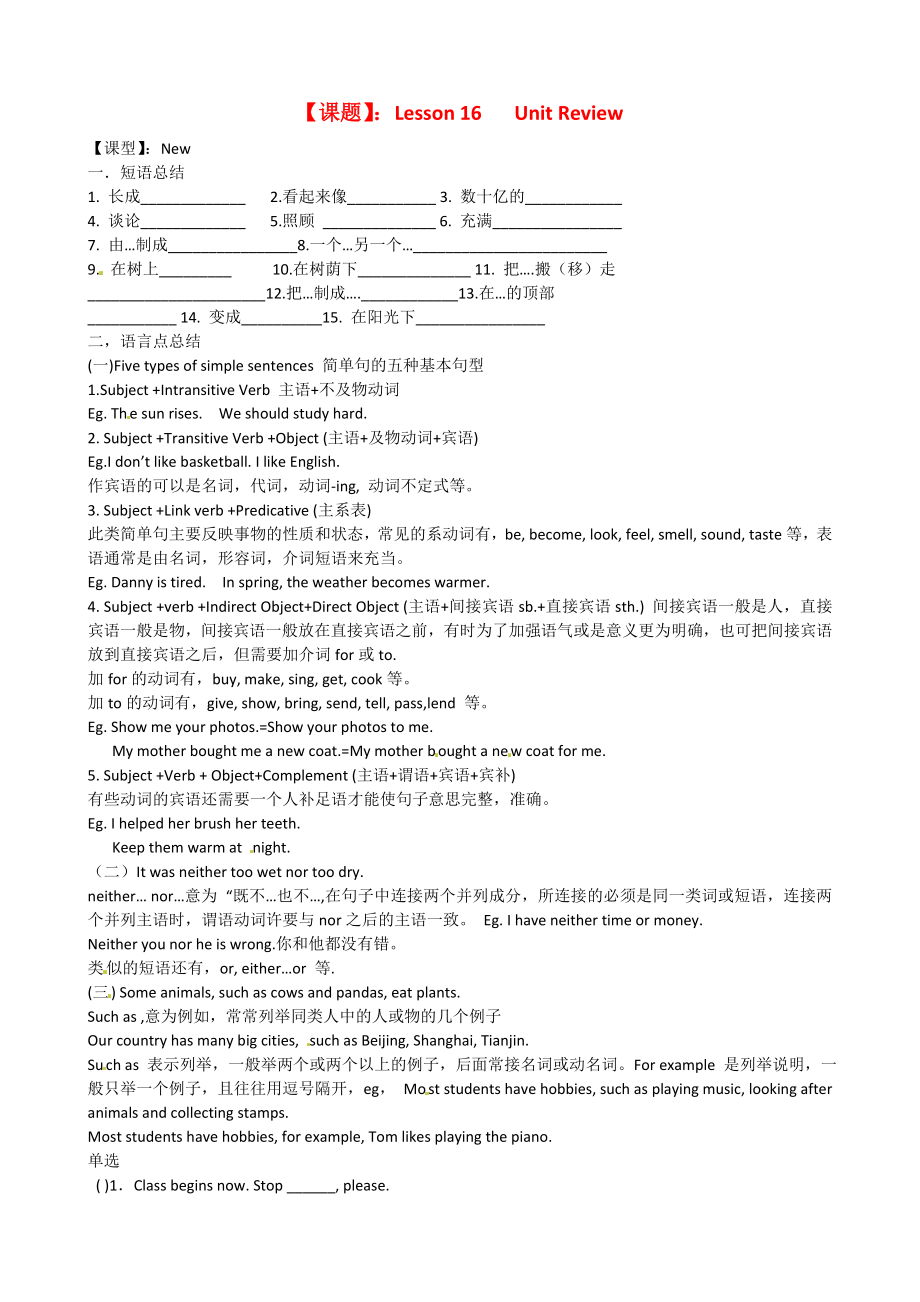《河北省唐山十六中八年級英語 Lesson 16 Unit Review學(xué)案(無答案) 冀教版》由會員分享��,可在線閱讀����,更多相關(guān)《河北省唐山十六中八年級英語 Lesson 16 Unit Review學(xué)案(無答案) 冀教版(2頁珍藏版)》請在裝配圖網(wǎng)上搜索。
1����、此資料由網(wǎng)絡(luò)收集而來����,如有侵權(quán)請告知上傳者立即刪除���。資料共分享�,我們負(fù)責(zé)傳遞知識���。
【課題】:Lesson 16 Unit Review
【課型】:New
一.短語總結(jié)
1. 長成_____________ 2.看起來像___________ 3. 數(shù)十億的____________
4. 談?wù)揰____________ 5.照顧 ______________ 6. 充滿________________
7. 由…制成________________8.一個…另一個…________________________
9. 在樹上_________ 10.在
2�����、樹蔭下______________ 11. 把….搬(移)走
______________________12.把…制成….____________13.在…的頂部
___________ 14. 變成__________15. 在陽光下________________
二����,語言點(diǎn)總結(jié)
(一)Five types of simple sentences 簡單句的五種基本句型
1.Subject +Intransitive Verb 主語+不及物動詞
Eg. The sun rises. We should study hard.
2. Subject +Transitive
3����、Verb +Object (主語+及物動詞+賓語)
Eg.I don’t like basketball. I like English.
作賓語的可以是名詞,代詞���,動詞-ing, 動詞不定式等�。
3. Subject +Link verb +Predicative (主系表)
此類簡單句主要反映事物的性質(zhì)和狀態(tài),常見的系動詞有�����,be, become, look, feel, smell, sound, taste等����,表語通常是由名詞�����,形容詞���,介詞短語來充當(dāng)�����。
Eg. Danny is tired. In spring, the weather becomes warmer.
4
4���、. Subject +verb +Indirect Object+Direct Object (主語+間接賓語sb.+直接賓語sth.) 間接賓語一般是人,直接賓語一般是物��,間接賓語一般放在直接賓語之前���,有時為了加強(qiáng)語氣或是意義更為明確��,也可把間接賓語放到直接賓語之后���,但需要加介詞for或to.
加for的動詞有��,buy, make, sing, get, cook等����。
加to的動詞有����,give, show, bring, send, tell, pass,lend 等。
Eg. Show me your photos.=Show your photos to me.
My mo
5���、ther bought me a new coat.=My mother bought a new coat for me.
5. Subject +Verb + Object+Complement (主語+謂語+賓語+賓補(bǔ))
有些動詞的賓語還需要一個人補(bǔ)足語才能使句子意思完整����,準(zhǔn)確���。
Eg. I helped her brush her teeth.
Keep them warm at night.
(二)It was neither too wet nor too dry.
neither… nor…意為 “既不…也不…,在句子中連接兩個并列成分��,所連接的必須是同一類詞
6����、或短語,連接兩個并列主語時�����,謂語動詞許要與nor之后的主語一致�����。 Eg. I have neither time or money.
Neither you nor he is wrong.你和他都沒有錯����。
類似的短語還有����,or, either…or 等.
(三) Some animals, such as cows and pandas, eat plants.
Such as ,意為例如,常常列舉同類人中的人或物的幾個例子
Our country has many big cities, such as Beijing, Shanghai, Tianjin.
Such as 表
7�、示列舉,一般舉兩個或兩個以上的例子��,后面常接名詞或動名詞���。For example 是列舉說明��,一般只舉一個例子���,且往往用逗號隔開���,eg, Most students have hobbies, such as playing music, looking after animals and collecting stamps.
Most students have hobbies, for example, Tom likes playing the piano.
單選
( )1.Class begins now. Stop ______, please.
A.to talk B
8�����、.talking C.talk D.talks
( ) 2.There isn’t ______ bread in the basket.
A.a(chǎn)ny B.some C.many D.lots
( )3.She often helps me ______ my English.
A.to B.a(chǎn)t C.for D.with
( )4.They have lunch at school, ______ they?
A.have B.haven’t C.don’t D.do
( )5.My mother told me ______ in bed.
A.don’t read B.not read C.not to read D.not reading
( )6The weather in Beijing is colder than______ in Hainai
A. those B. that C. the one D. this
( )7. The baby is too young to get ______.
A. dress B. dressing C. to dress D. dressed
 河北省唐山十六中八年級英語 Lesson 16 Unit Review學(xué)案(無答案) 冀教版
河北省唐山十六中八年級英語 Lesson 16 Unit Review學(xué)案(無答案) 冀教版

